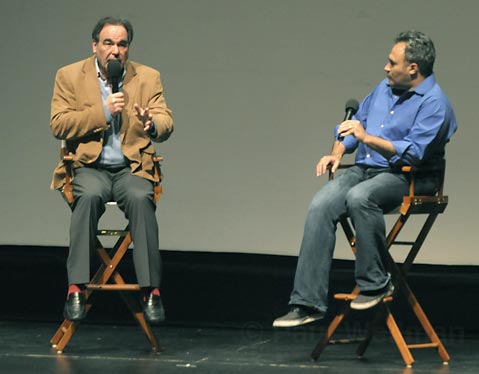Border Patroller Oliver Stone
Woodard Reports on South of the Border, Thousand Year Song, and Bran Nue Dae

Saturday evening on the Lobero stage, Oliver Stone, ever outspoken and happy to size up the world as he sees fit, was speaking about the disturbing and mainstream media-fueled ignorance of much of America. The setting was a rare screening of South of the Border, his new and fascinating, if definitively fast-and-loose, documentary on the new left-leaning Latin American political scene.
But despite his dim appraisal of American intelligence and inquiry the moment, the relatively more enlightened burg of Santa Barbara, he allowed, “may be an outpost.” It’s an outpost he knows something about. Stone did an early screening of his politicized feature Salvador at SBIFF many years ago, with James Woods in tow, and the self-described “firebrand” filmmaker lived here for a time — around the period of The Doors. (Another trivial pursuit factoid: the drug baron’s bloodied mansion in the Stone-penned Scarface was in Montecito.)
Stone’s freewheeling discussion from the Lobero stage differed from the star-studded Oscar season celebs who have passed through town during the film festival, one more whistle stop in the midst of their blurry promo blitzes. Stone was not here to hype his latest wampum Hollywood product (Wall Street 2, coming soon to a multiplex near you), but rather to help out this humbler filmic child, from the growing documentary sidebar of his filmography. This Stone film may never be readily available in the United States: Showtime plans to show it, but HBO had earlier reneged on screening his previous Fidel Castro film, Commandante, under corporate pressure.
South of the Border is an on-the-fly project, made mostly from archival footage, media clips, and footage of Stone’s visits — Michael Moore-style — with several presidents of the more self-determination-minded Latin America at present. Shot during a whirlwind, week-long visit to points in South America during a break from production on Wall Street 2, the film was, as Stone said, “done with my left hand, on the run.” In the film, he mixes scraps of historical backdrop, humanity, and humor — i.e. staging a funny scene with Chavez riding a child’s bike, or Stone playing soccer with Bolivian president Evo Morales, buzzed after chewing coca leaves (not “cocoa” leaves, as the Fox News clip puts it). South of the Border, while a rough and a rush job, offers a valuable, on-the-ground perspective and primer on the current encouraging state of Latin American politics. Its greatest virtue may be the humanizing view of Chavez, so distorted and demonized in these United States.
Saturday’s extended event was also charming in terms of live theater. Stone cut the image of an obsessive, slightly disheveled professor, in his mismatched fire engine red socks and fumbling his water bottle in the heat of making points. At one point, he suggested an underlying agenda for many of his films as he went on a rant against the American “fear of the Enemy — capitol ‘E.’ We’re obviously under the influence of something. Is it the water?” Re: crazed politicians, Stone asked, “Do you have to lose your mind to be part of the political machinery? It makes me long for civilization.” That longing apparently keeps pumping through his veins and beefing up his oeuvre.
Speaking of films which broaden our knowledge of the world — and a very specific piece of land and ancient culture within it — the calming compelling Japanese documentary A Thousand Year Song is a thorough and beautiful portrait of a Senegalese village. At the film’s and the village’s center, a thousand-year-old baobab tree, the film’s symbol of continuum and cultural continuum, blissfully outside the plugged-in hubbub of modern 21st century life. The film is a nice respite from the edgier images and ideas necessarily put forth in a contemporary film festival worth its salt.
In other pure joie de vivre news, the Australian musical Bran Nue Dae may be the fizziest fun of the SBIFF roster this year. Filmmaker Rachel Perkins cooks up bright and festive energies and a cheeky tale involving Aboriginal life, hippies, errant priests, and the alluring western Australian landscape…all while giving in regularly to the urge to break into song and dance. Gotta’ love it, mate.



